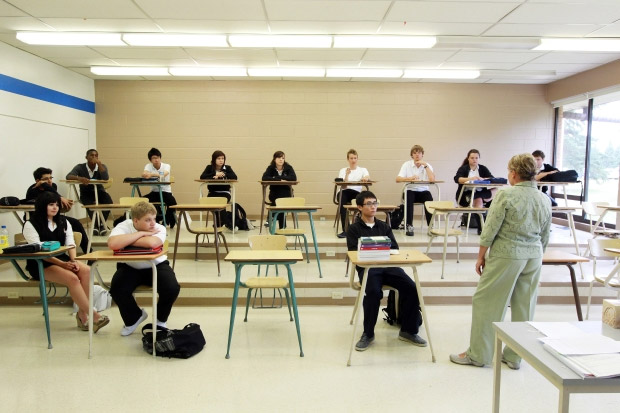TORONTO – The union representing public high school teacher shouldn’t be rewarded with a sweetened contract after putting students and parents through the wringer for eight months with no extracurricular activities, the Progressive Conservatives said Friday.

The Ontario Secondary School Teachers’ Federation is now getting changes to the current contract that will end up costing more when the province is facing a $12-billion deficit, said Tory critic Lisa MacLeod.
“Our kids in Ontario have just gone through the roughest eight months in some of their young lives at their schools, and (Premier) Kathleen Wynne allows the unions to have a do-over,” she said.
“Both these unions — ETFO and OSSTF — all they had to do a year ago was actually sit at the bargaining table and respect the financial parameters the province is in.”
Under a new tentative agreement reached with the governing Liberals, teachers will get improved maternity leave and sick day benefits, as well as fewer unpaid days off.
The proposed changes to the current contract imposed by the government in January would reduce unpaid days from three to one for teachers.
Support staff won’t have to take any and can’t be laid off unless enrolment is declining, the government cuts funding for a specific program, or “catastrophic events,” according to a union document.
The unpaid days were supposed to be taken so that younger teachers could still move up the salary grid, which gives raises based on experience and qualifications.
- Pedestrian in life-threatening condition after being hit by vehicle in Mississauga
- Judge at trial of man accused of killing cop was concerned over Crown changing theory
- Ontario transportation minister pitches 24-hour work to speed up Gardiner construction
- ‘Love at first sight’: Snow leopard at Toronto Zoo pregnant for 1st time
The government has now agreed not to make any changes to the salary grid, which was supposed to be reviewed.
More union members would be eligible for the improved maternity leave and sick leave benefits under the deal, and younger teachers will be given a much better payout for their banked sick days as well.
Cashing out banked sick days at retirement was a big bone of contention between teachers’ unions and the government last year, with the Liberals warning that it was a $1.4 billion liability on the province’s books.
Under the current contracts, teachers can no longer bank sick days, but those banked before last September can still be cashed out at retirement.
Now teachers with less than 10 years on the job would be able to collect 25 cents on every dollar for sick days they banked, compared with 10 cents under existing agreements.
The changes don’t affect veteran teachers who have so-called “vested” sick days, who will get about 50 cents on the dollar on retirement.
Apart from the adjustments that would be made to allow for fewer unpaid days, it wasn’t clear from the document how the other changes would be funded.
The change to the retirement gratuity alone could cost the province $63 million, said MacLeod.
“There’s a reduction in unpaid days, there’s more benefits for maternity leave, there’s also job security built into these contracts,” she said.
“So yes, it’s going to cost a lot of money. And it will cost money now and into the future.”
Agreements signed with the English Catholic teachers last summer had a “me too” clause, which means they’ll get the same changes to their contracts, she said.
“This could potentially put taxpayers on the hook for a great amount of money or, the alternative, is actually take it away from existing programming, and those are the choices that school boards are going to have to make,” MacLeod said.
John Shea, a school board trustee in Ottawa, said it’s unclear how the changes might affect school boards.
“We just don’t have a clue,” he said.
“We don’t have a clue because these discussions have been held in secret without input from the employer, which is school boards. So that has been troubling for me personally.”
Wynne insists no additional money will be spent to improve the contracts with both elementary and high school teachers.
“The funding of the agreements is being done out of the envelope that was in the collective agreement,” she said Thursday.
“So there is no new money coming from anywhere else in education in order to fund the agreements.”
The new agreement hasn’t been approved yet by union members, but the outcome of that vote is expected April 18.

Comments